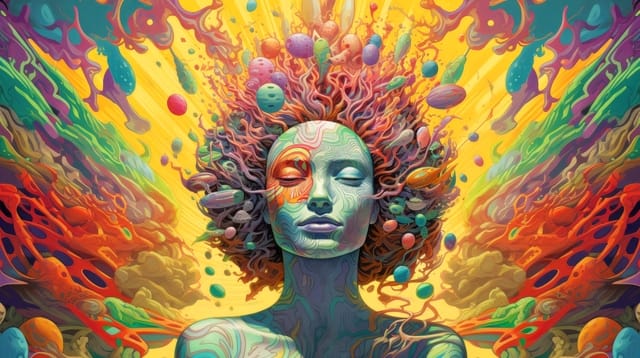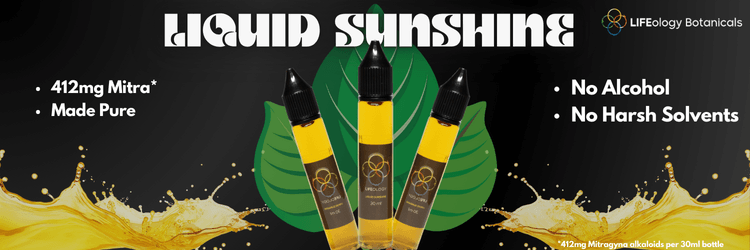Research on multiple psychedelics shows optimistic results in recent clinical studies. These substances have been found to offer significant mental health benefits when used in controlled, therapeutic settings. For example, psilocybin has shown potential in reducing symptoms of depression and anxiety, particularly in patients who have not responded to traditional treatments. MDMA-assisted treatment has shown effectiveness in helping individuals with post-traumatic stress disorder (PTSD). At the same time, LSD has been studied for its potential to reduce end-of-life anxiety in terminally ill patients. Despite their present legal status in many regions, these discoveries have sparked discussions about the therapeutic potential and future medical applications of psychedelics.
Here’s a list of five psychedelics that are currently illegal in many jurisdictions but have shown promising health and mental health benefits in research:
Psilocybin (Magic Mushrooms)
Depression Treatment: Psilocybin has shown promise in reducing symptoms of major depressive disorder, often for longer durations compared to traditional antidepressants.
Anxiety Reduction: It can help alleviate anxiety, especially in people facing life-threatening illnesses, by altering perspective and reducing the fear of mortality.
PTSD Relief: Early research indicates potential benefits for those with post-traumatic stress disorder, helping to process trauma in a new way.
Addiction Treatment: Psilocybin is used in treating substance abuse disorders, including alcoholism and smoking addiction, by breaking compulsive patterns and promoting healthier behaviors.
Improved Emotional Processing: It can enhance emotional processing and empathy, which may benefit personal relationships and overall emotional well-being.
Cluster Headache Relief: Some evidence suggests psilocybin may alleviate cluster headaches, also known as “suicide headaches,” through its impact on brain chemistry.
Neuroplasticity Enhancement: Psilocybin encourages neurogenesis (the growth of new brain cells) and improves brain plasticity, possibly contributing to improved cognitive function.
Reduction of Fear Responses: It may decrease activity in the amygdala, the brain’s fear center, helping individuals overcome deep-seated fears and anxieties.
Openness and Creativity: Users report increased openness, creative thinking, and appreciation for life and the arts after psilocybin experiences.
Increased Mindfulness: It can promote a greater focus on the present moment, aiding in mindfulness practices and reducing mind wandering.
MDMA (Ecstasy/Molly)
PTSD Treatment: MDMA-assisted psychotherapy has offered promise in reducing symptoms of post-traumatic stress disorder (PTSD) by helping patients process traumatic memories in a supportive and compassionate environment.
Increased Emotional Processing: The drug may enhance emotional openness and self-awareness, enabling deeper emotional processing and the potential resolution of past emotional trauma.
Reduction in Fear and Anxiety: MDMA reduces activity in the amygdala, which is associated with the fear response, making it easier for people to confront and work through fear-based memories.
Improved Therapeutic Alliance: The increased feelings of trust and compassion can support the therapeutic association between patients and therapists, making therapeutic interventions more effective.
Boosted Mood and Well-Being: MDMA releases large amounts of serotonin, dopamine, and norepinephrine, leading to an improved sense of well-being, happiness, and emotional connection.
Potential Social Anxiety Relief: Studies have examined its use for social anxiety, particularly in autistic adults, showing likely improvements in comfort and ease in social settings.
Reduction in Substance Use Disorder Symptoms: Initial research suggests that MDMA may help in treating addiction by encouraging greater self-acceptance and understanding of underlying issues.
Enhanced Interpersonal Connection: Feelings of increased empathy and closeness to others can be beneficial in repairing or strengthening relationships.
LSD (Lysergic Acid Diethylamide)
Treatment for Anxiety and Depression: Studies have indicated that LSD, when used in a controlled, therapeutic setting, can relieve symptoms of anxiety and depression, particularly in people with terminal illnesses.
Enhanced Emotional Processing: LSD has helped individuals process emotions and past traumas, potentially aiding in emotional release and healing.
Improved Creativity and Problem-Solving: Some users experience heightened creativity and novel approaches to problem-solving during or after LSD use.
Reduction in Substance Abuse: LSD-assisted therapy has shown promise in helping individuals reduce or eliminate their dependence on substances like alcohol and tobacco.
Long-Term Mental Health Improvements: Some people experience lasting improvements in mood and a greater sense of life satisfaction following therapeutic LSD experiences.
Treatment for Cluster Headaches: LSD and related psychedelics have been used to treat cluster headaches, providing relief where traditional therapies have failed.
Reduction in Obsessive-Compulsive Symptoms: Preliminary research suggests that LSD may help ease symptoms in individuals with Obsessive-Compulsive Disorder (OCD).
Ayahuasca
Emotional Healing and Release: Ayahuasca facilitates emotional release and healing by bringing suppressed emotions and traumas to the surface.
Improved Mood and Reduced Depression: Some studies have shown that Ayahuasca can reduce symptoms of depression, possibly due to its effects on serotonin receptors.
Treatment of PTSD: Ayahuasca has been used to help people who have post-traumatic stress disorder (PTSD) by allowing them to process and work through trauma in a guided setting.
Enhanced Personal Insight: People report gaining insights into their behaviors, thoughts, and relationships, which can lead to personal growth and better decision-making.
Reduced Anxiety: Many users have experienced a substantial decrease in anxiety, feeling a greater sense of peace and well-being after Ayahuasca ceremonies.
Spiritual Awakening and Connection: The brew often induces spiritual experiences that create a sense of connection to the universe, nature, or a higher power, contributing to spiritual well-being.
Addiction Recovery: Ayahuasca is used in therapeutic settings to treat addiction, helping people understand the root causes of their dependencies and fostering a journey toward healing.
Anti-Inflammatory Properties: Some Ayahuasca compounds have anti-inflammatory properties, which may contribute to their potential physical health benefits.
Neurogenesis and Brain Health: Preliminary research suggests that the brew may promote neurogenesis (the growth of new neurons) and support brain health.
Reduced Emotional Reactivity: Users have reported a calmer response to stress and a decrease in emotional reactivity after experiences with Ayahuasca.
Enhanced Creative Thinking: Many people experience an increase in creative thinking and problem-solving abilities.
Ketamine
Rapid Antidepressant Effects: Ketamine has been shown to provide quick relief from severe depressive symptoms, often within hours, which is especially beneficial for individuals with treatment-resistant depression.
Reduction in Suicidal Ideation: Ketamine can significantly lessen suicidal thoughts, making it a valuable treatment option in crisis situations.
Anxiety Reduction: Some studies have shown that ketamine infusions may help relieve symptoms of anxiety disorders, including generalized anxiety disorder (GAD) and social anxiety disorder.
Post-Traumatic Stress Disorder (PTSD) Relief: Ketamine has demonstrated effectiveness in alleviating symptoms of PTSD, including flashbacks and heightened anxiety.
Chronic Pain Management: It is used for chronic pain conditions such as complex regional pain syndrome (CRPS) and neuropathic pain, providing both physical and emotional relief.
Neuroplasticity: Ketamine promotes neuroplasticity, the brain’s ability to form new connections, which may help improve cognitive function and emotional regulation.
Addiction Treatment: Emerging research suggests that ketamine-assisted therapy may help in breaking addiction cycles, especially in cases of alcoholism and opioid dependence.
Reduction of OCD Symptoms: It has shown promise in easing symptoms of obsessive-compulsive disorder (OCD) in some patients.
Improvement in Emotional Resilience: By targeting NMDA receptors, ketamine helps increase the brain’s adaptability, potentially increasing emotional resilience to stress.
Alleviation of Bipolar Depression: Unlike some traditional antidepressants, ketamine may be useful in treating depressive episodes in patients with bipolar disorder.
The growing body of research on psychedelics highlights their significant potential as therapeutic tools for mental health and wellness. Despite the legal regulations surrounding substances like psilocybin, MDMA, LSD, Ayahuasca, and ketamine, clinical studies consistently demonstrate their ability to address conditions such as depression, anxiety, PTSD, and addiction, often outperforming the efficacy of pharmaceutical treatments. These substances also promise to facilitate emotional healing, enhance neuroplasticity, and improve overall well-being. As research advances and public awareness grows, the path forward may include thoughtful discussions on the ethical, legal, and medical integration of psychedelics into mainstream therapeutic practices. Such progress could transform mental health treatment, offering hope and healing to those in need.



0 Comments